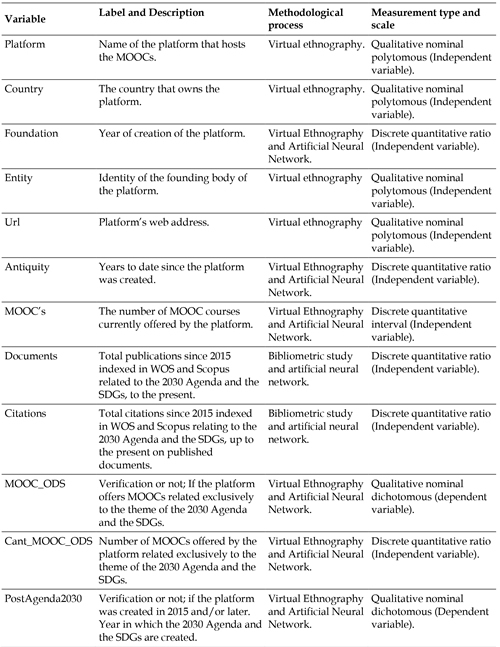
doi.org/10.15178/va.2021.154.e1386
RESEARCH
CREATION OF AN ARTIFICIAL NEURAL NETWORK TO PREDICT THE BEHAVIOR OF MOOC PLATFORMS ON THE 2030 AGENDA AND THE SUSTAINABLE DEVELOPMENT GOALS
CREACIÓN DE UNA RED NEURONAL ARTIFICIAL PARA PREDECIR EL COMPORTAMIENTO DE LAS PLATAFORMAS MOOC SOBRE LA AGENDA 2030 Y LOS OBJETIVOS PARA EL DESARROLLO SOSTENIBLE
CRIAÇÃO DE UMA REDE NEURONAL ARTIFICIAL PARA PREVER O COMPORTAMENTO DAS PLATAFORMAS DE MOOC NA AGENDA 2030 E OS OBJETIVOS DE DESENVOLVIMENTO SUSTENTÁVEL
Jose Javier Hueso Romero1
1Universidad Nacional de Educación a Distancia, Spain
ABSTRACT
This study addresses an investigation and analysis on the behavior and current offer of MOOC platforms vis-à-vis the 2030 Agenda and the Goals for Sustainable Development. MOOCs are a communicational model in increasingly entrenched teaching-learning processes, in addition to improving the digital skills of citizens. A mixed research methodological procedure is established, through in-depth virtual ethnography and analysis of the most significant MOOC platforms, and a bibliometric study in Web of Science and Scopus, to know the scientific production of the countries on this subject, in order to conclude research with the creation of an artificial neural network that predicts the future offer of MOOC courses related to the 2030 Agenda, and the development and implementation of new specialized platforms in this type of course.
KEYWORDS: MOOC, Agenda 2030, Neural network, Bibliometry, Virtual ethnography, Digital competences, Communication, Educommunication, e-learning
RESUMEN
El presente estudio aborda una investigación y análisis sobre el comportamiento y oferta actual de las plataformas MOOC frente a la Agenda 2030 y los Objetivos para el Desarrollo Sostenible. Los MOOC son un modelo comunicacional en los procesos de enseñanza-aprendizaje cada vez más arraigado, además de que mejoran las competencias digitales de la ciudadanía. Se establece un procedimiento metodológico de investigación mixto, mediante una profunda etnografía virtual y análisis de las plataformas MOOC más significativas, y un estudio bibliométrico en Web of Science y Scopus, para conocer la producción científica de los países sobre esta temática, al objeto de concluir la investigación con la creación de una red neuronal artificial que pronostique la oferta futura de cursos MOOC relacionados con la Agenda 2030, y el desarrollo e implantación de nuevas plataformas especializadas en este tipo de cursos.
PALABRAS CLAVES: MOOC, Agenda 2030, Red neuronal, Bibliometría, Etnografía virtual, Competencias digitales,Comunicación, Educomunicación, e-learning
RESUMO
Este estudo aborda uma investigação e análise sobre o comportamento e a oferta atual das plataformas MOOC em relação à Agenda 2030 e aos Objetivos de Desenvolvimento Sustentável. Os MOOCs são um modelo comunicacional nos processos de ensino-aprendizagem cada vez mais arraigados, além de aprimorar as competências digitais dos cidadãos. É estabelecido um procedimento metodológico misto de pesquisa, por meio de aprofundada etnografia virtual e análise das plataformas MOOC mais significativas, e um estudo bibliométrico em Web of Science e Scopus, para conhecer a produção científica dos países sobre o assunto, a fim de concluir a pesquisa com a criação de uma rede neural artificial que prevê a oferta futura de cursos MOOC relacionados com a Agenda 2030, e o desenvolvimento e implementação de novas plataformas especializadas neste tipo de curso.
PALAVRAS CHAVES: MOOC, Agenda 2030, Rede neural, Bibliometria, Etnografia virtual, Competências digitais, Comunicação, Educomunicação, e-learning
Correspondence
Jose Javier Hueso Romero. Universidad Nacional de Educación a Distancia, Spain. jhueso3@alumno.uned.es
Received: 26/05/2021
Accepted: 15/12/2021
Published: 03/01/2022
How to cite the article
Hueso Romero., J-J. (2022). Creation of an artificial neural network to predict the behavior of MOOC platforms on the 2030 agenda and the sustainable development goals. Vivat Academia. Revista de Comunicación, 155, 61-89. http://doi.org/10.15178/va.2021.154.e1386
Translation by Paula González (Universidad Católica Andrés Bello, Venezuela)
1. INTRODUCTION
In September 2015, world leaders established a set of global goals to eradicate poverty, protect the planet, and ensure prosperity for all, based on a new agenda for sustainable development, made up of seventeen goals and with specific goals to be achieved. This research is located in objective number four, “Quality education” (De la Rosa et al., 2019) ? which determines to guarantee an inclusive, equitable, and quality education, promoting learning opportunities throughout life (Elfert, 2015) ? and for all people. This objective is an important link with the main purposes and intention of the 2030 Agenda (Colglazier, 2015) since quality education will enable upward socioeconomic mobility to eradicate and escape the cycle of poverty, besides empowering people around the world to lead healthier and more sustainable lives. From the “Quality Education” objective of the 2030 Agenda, the acquisition of digital skills is promoted (Ghomi and Redecker, 2019) to access the work and professional world of our era. Furthermore, education fosters tolerance among people, contributes to the creation of more peaceful societies, and reduces inequalities by achieving gender equality. UNESCO, in March 2020, launched the Global Coalition for Education COVID-19 (Daniel, 2020) ?, to design and implement innovative solutions and help countries address gaps in content and connectivity, and facilitate inclusive learning opportunities (Meskhi et al., 2019) for children and youth during this period of sudden and unprecedented educational disruption. Now more than ever, given the global situation presented by the 2030 Agenda, global communication models must be established (Bagdasaryan and Nalimova, 2021) to redefine international relations and the power of information and build accessible and sustainable education systems. The World Coalition for Education (Sanz Ponce and González Bertolín, 2018) ? intends to help countries mobilize resources and implement innovative and context-appropriate solutions to provide distance education, while taking advantage of the approaches of high technology, low technology or no technology, and seek equitable solutions with universal access. However, one of the most important documents on the 2030 Agenda and the goals for sustainable development (hereinafter SDG), was produced in June 2017 by the Communication Network for Development of the OECD (Organization for Economic Cooperation and Development). This document called “What people know and think about the SDGs” (OECD, 2017) ? exposes the selection and compilation of various international public opinion surveys on the SDGs and presents worrying results by indicating that only 1 in 100 citizens (out of 24 countries) know them very well, 25% say they only know the name, and 1 in 10 Europeans knows what they are. In this sense, the massive, open, and online courses (hereinafter MOOC) (García Aretio, 2015), can be an important resource to inform and educate the population about what the 2030 Agenda is and its objectives, besides guarantying to those poorer countries their inclusiveness in training processes and the promotion of lifelong learning opportunities, from the cooperation and collaboration of the more developed countries (Roura Redondo, 2019)?. MOOCs should be used as a resource (Saykili, 2018) that can create links between different countries, generating communication channels from education and training for life agenda and the sustainable development goals
Today, there are important virtual platforms (Del Moral Perez and Villalustre Martínez, 2015) ? that offer MOOCs, in a diversity of languages and accessibility, that can reach any corner of the planet through the internet, and, thus, increase training so that people acquire the necessary skills, both technical and professional, for access to employment and human training (Popkova and Zmiyak, 2019). Given the importance of the great ignorance that exists today on this issue, it is intended, through this study, to know what relationship and behavior exist between the MOOC platforms, the 2030 Agenda, and the SDGs; check if these platforms offer this topic and to what extent they do it to train and raise awareness among citizens; discover what new platforms have been created in the world after the creation of the 2030 Agenda; describe which countries produce more documentation and/or research through the scientific identification services Web of Science and Scopus (Salvador Oliván and Agustín Lacruz, 2015) ? on this matter, and finally, predict with all the data and information collected, to what extent MOOC platforms are going to offer courses on the SDGs and the 2030 Agenda and in what percentage is it estimated that new significant MOOC platforms will be able to be created in the world. These last forecasts are made in the research by creating an artificial neural network (Rivera, 2007)?, a computational model that, through the input and/or data layers of the study variables, is exposed to certain operations that produce output results. Since these systems try to train themselves and learn automatically, they aim to solve problems just like the human brain to minimize error and refine their results. We live in an increasingly technological world, in which digital skills must be constantly acquired and renewed to promote inclusion and participation in society, and in this way achieve a more equitable world and more accessible to knowledge (Sánchez Prieto et al., 2020).
The novel and innovative nature of this study that is presented is based on the fact that there are only studies on the importance that MOOCs can have and their contribution to achieving the goals proposed in objective 4 "Quality Education" as a technological resource and of access to education (Santoveña Casal and Fernández Pérez, 2020), but not as a specific offer and proposal of courses focused on the 2030 Agenda and the SDGs, and the creation of new platforms that train and raise awareness in societies to achieve the proposed goals (Martínez A, 2015)?. As a justification for this research, societies must become aware that the proposals and objectives set out in the 2030 Agenda must be achieved to attain a more sustainable and equitable world, not without first discovering in more detail and depth what they consist of and the way to approach them, both from a firm proposal of "Quality Education" and from MOOCs and the platforms that offer them (Gil Pérez and Vilches, 2017). Regarding the objectives and the proposed problem, the following hypotheses are estimated (Espinosa, 2018) ?for this research, which will be approached with the data and results obtained in an analysis of the MOOC platforms and virtual ethnography (Ruiz Méndez and Aguirre Aguilar, 2015), a bibliometric study (Balsells et al., 2019; “Author” and Gil Quintana, 2020; Ruiz de Osma, 2005) ? on scientific literature related to the 2030 Agenda, and the SDGs and the creation of the neural network artificial, to predict the evolution of platforms and the offer of MOOC courses with this theme.
2. METHODOLOGY
To carry out this research, a triangulation of quantitative and qualitative techniques has been carried out (Aguilar and Barroso, 2015)?, thus developing a mixed research methodology (Delgado et al., 2019) ?to contrast the data and results obtained with the proposed objectives and hypotheses. The design that has been used for this research is adjusted to concurrent triangulation strategies, using a data collection phase, during which the collection and analysis of quantitative and qualitative data are carried out separately, but simultaneously. The results are integrated during the interpretation phase of the study, giving the same priority and importance to both types of research. From a qualitative point of view, information will be collected through observation and registration, categorizing and quantifying the data obtained, to achieve a more panoramic view of the results. From a quantitative point of view, the data will be used to explain and/or forecast the behavior of virtual platforms and their offer in MOOC courses related to the 2030 Agenda. The techniques to be used for data acquisition, recording, and analysis, are detailed below.
Next, in Table 1, the study variables for the established research process are detailed: type, measurement scale, and research technique of which it is part (Garcia et al., 2016)?. Later, the methodological process is developed in more detail.
Table 1. Variables for the research, type, and measurement scale

Source: own elaboration
The results obtained on the platforms that host MOOCs are made through the selection of various search engines (Platero Alcón, 2016)?, established and consolidated on the internet, according to their use, presenting different models in the use of their own algorithms and privacy functions, to obtain results without bias, when indexing the web differently. The matching results from the search engines used for this research will facilitate the virtual MOOC platforms to be analyzed. The search resources used have been the following: Google, Bing, DuckDuckGo, Archive.org, StartPage, Gibiru, Qwant, Yahoo search, Ask.com, and Ecosia. Once all the platforms have been identified, each one of them is analyzed to extract the information related to the designated variables. In Figure 1, the eco-learning platform (Osuna Acedo and Gil Quintana, 2017) ? is observed as a sample, on which the analysis and data extraction is carried out through the information it offers and its MOOC search engine.
Source: Web platform Eco-learning
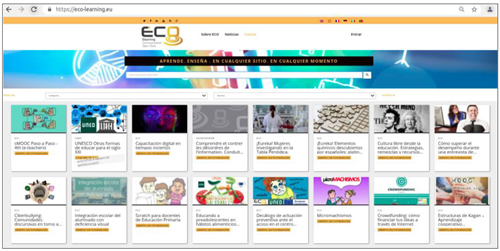
Figure 1. Analysis of MOOC platforms to obtain data
Regarding bibliometric analysis, the specialized software vosviewer v1.6 (Van Eck and Waltman, 2017) ?? is used, to which the results obtained in the online scientific information services Web of Science and Scopus are exported. The results provide data on the total number of documents and citations made in the temporal space (2015-2021), and bibliometric maps are prepared to determine which countries are the largest scientific producers on research in the 2030 Agenda and SDG. The results are related to those countries that have and offer MOOCs, and the variables from this bibliometric analysis are included in the creation of the artificial neural network. The algorithm (Sánchez et al., 2016) ?for obtaining the results is as follows:
(TITLE ("2030 agenda") OR TITLE ("SDG") OR TITLE ("Sustainable development goals")) AND (LIMIT-TO (PUBYEAR, 2021) OR LIMIT-TO (PUBYEAR, 2020) OR LIMIT-TO (PUBYEAR, 2019) OR LIMIT-TO (PUBYEAR, 2018) OR LIMIT-TO (PUBYEAR, 2017) OR LIMITED TO (PUBYEAR, 2016) OR LIMITED TO (PUBYEAR, 2015)) AND (LIMIT-TO (DOCTYPE, "ar")) AND (LIMIT-TO (SUBJAREA," SOCI ") OR LIMIT-TO (SUBJAREA," ARTES"))
This algorithm is applied in the online services of scientific databases Web of Science and Scopus, which collect the references of the main scientific publications, essential for supporting research and the recognition of the efforts and advances made by the scientific and technological community. Both resources are endorsed in terms of their validity and quality, by the main scientific institutions that are in charge of measuring, evaluating, and calculating the impact factor of the journals indexed in both resources. With the data obtained from both virtual ethnography and bibliometric analysis, an artificial neural network is developed to predict in what percentage platforms that offer MOOCs courses are going to be created and, on the other hand, in what percentage MOOCs with the main theme based on the 2030 Agenda and the SDGs are going to be created. Artificial neural networks work in a similar way to biological neuron networks. The artificial neural network created for this research is made up of artificial neurons connected to each other and grouped at different levels called layers. The input layer receives real data from the study variables (independent variables) and feeds the neural network. The last layer or output layer will be the results and/or percentages that we want to predict, (dependent variables). Between these two, are the hidden layers that contain unobservable units, representing the intensity of the interaction towards the output layers. Therefore, the model of this research is defined as a multilayer neural network since there are intermediate or hidden layers between the input layer and the output layer. The calculations are carried out through the specialized software SPSS v.22, and this determines a total of 29 valid cases of the identified platforms. Of these, it selects 23 (79.3%) as training that, using certain algorithms, will try to find the weights automatically to offer the best results. The 6 remaining cases (20.7%) are selected for tests, it is overfitting since the model may adjust too much to the particularities present in the training patterns, losing the ability to generalize their learning to new cases. Therefore, the objective of this new test is to obtain data and test how the neural network would behave when the inputs are different from those used for training. The neural network designed for this research can be tested with other input patterns with which it has not been trained, that is, other values for the defined independent variables, to predict and forecast in what percentage more significant MOOC platforms will be created and in what percentage will MOOCs be created related to the theme centered on the 2030 Agenda and the SDGs. As can be seen in Table 2, the variables selected for the input layer (independent variables) are those that determine the year of creation of the MOOC platform and age, the amount of MOOCs it offers, the MOOCs about the 2030 Agenda and the SDGs, the scientific production, and citations obtained. For the output layer (dependent variables) and results of the Artificial Neural Network, the forecast on the creation of MOOC platforms, PostAgenda2030 variable, and forecast on the creation of MOOC courses focused on content about the 2030 Agenda and the SDGs, MOOC_ODS variable.
Table 2. Layers established for the Artificial Neural Network
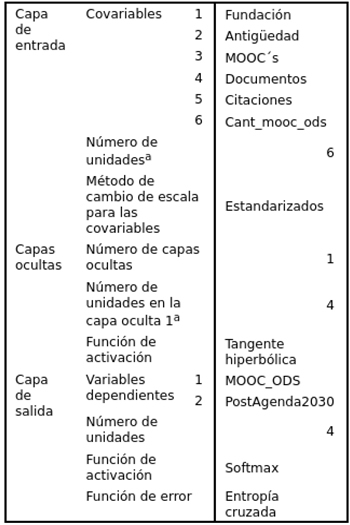
a. excluyendo la unidad de sesgo
Source: SPSS v.22
3. RESULTS
3.1. Analysis of the observed MOOC virtual platforms
Source: own elaboration. Data extracted from virtual ethnography
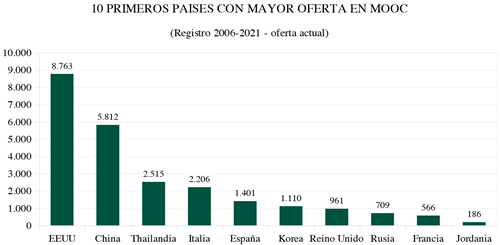
Chart 1. Countries with the highest offer in MOOCs currently
Entering a more exhaustive analysis of these data, Table 3 shows the MOOCs offered by the platforms that were created from 2015 to the present in the column ≥2015, the date on which the 2030 Agenda is formalized. These data are updated as of May 2021. China offers a total of 2,259 MOOCs in its new platforms created since 2015 to date, by creating in 2015 a new platform called enMOOC from Shanghai Jiaotong University with a current offering of 2,259 MOOCs. It is followed by Italy, which did not have significant MOOC platforms until then, and it is in 2015 and 2016 when the Federica.eu and EduOpen platforms were created respectively, with a total of 2,206 MOOCs currently between the two. New platforms are being created by countries that did not have them before the 2030 Agenda, and whose MOOC offer is the following: Korea (n = 1,110), Russia (n = 709), India (n = 394), Indonesia (n = 34), Mexico (n = 13), highlight the EMM project and platform of the European Union that was created in 2019 and that currently offers 146 MOOCs. Thailand also created in 2017 ThaiMOOC, a platform that currently offers 477 MOOCs.
Table 3. MOOC production by countries, before and after the 2030 Agenda
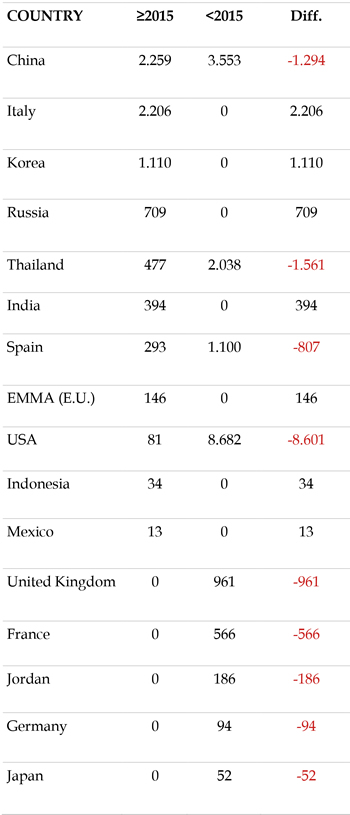
Source: own elaboration. Data extracted from virtual ethnography
On the other hand, regarding Table 3, we point out countries such as the United Kingdom, France, Germany, Jordan, or Japan, which have not created significant platforms based on the 2030 Agenda (2015). The USA only creates the Kadenze platform with 81 MOOCs and Spain AprendeINTEF with 293 MOOCs, both founded in 2015. We highlight countries that create MOOC platforms after the 2030 Agenda such as China, Italy, Korea, Russia, Thailand, India, and the project EMMA of the European Union (EU, 2021). Column <2015 of Table 3, indicates the current MOOC offer by the platforms created before the 2030 Agenda. The Diff column indicates the difference between the two periods, that is, the offer that each country performed with its platforms created before and after 2015. Based on virtual ethnography and study of virtual platforms that offer MOOCs, we indicate that 30% of the platforms selected for this study offer MOOC courses with a theme centered on the 2030 Agenda, and the SDGs, with a total of 14 courses, the details of which are shown in Table 4. With the results obtained in Table 4, it is confirmed that the offer of MOOC courses focused on the main theme of the 2030 Agenda and the SDGs is barely relevant, so hypothesis 2 of the research is not fulfilled, which enunciated a greater and more encouraging offer on this subject. However, the data regarding the creation of new MOOC platforms since the formalization of the 2030 Agenda is somewhat more stimulating, representing 30% of the total platforms selected for this study.
Table 4. MOOCs focused on the SDGs and the 2030 Agenda
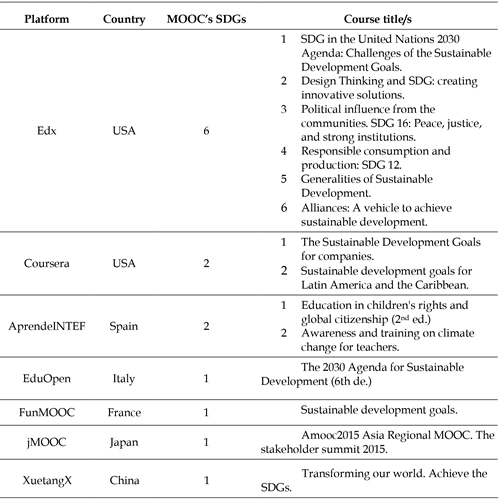
Source: own elaboration
As extended information, Table 5 presents the data obtained in virtual ethnography and analysis of virtual platforms that host MOOC courses. Those platforms that have been created from the formalization of the 2030 Agenda in 2015 are clearly observed. The results present the name of the platform, year of creation, country, number of MOOCs that are offered as of today, owning entity, the web address of the platform, and the number of MOOCs whose theme is focused on the SDGs and the 2030 Agenda, and which have been specified with more precision in the previous table (table 4). As detailed in Table 5, with the data obtained, and regarding hypothesis No. 1, it is confirmed that this is not fulfilled, since the 2030 Agenda was carried out in 2015, the same virtual platforms in the West as in the rest of the world, specifically Asia and the East, have been created. However, there is a much greater supply and production from Asian and Eastern countries than Western ones, highlighting China, Korea, Thailand, India, Indonesia, and Russia in the Eurasian zone. In the western zone, we highlight Italy, Spain, and the European project EMMA. In South America, the platform belonging to Mexico (MéxicoX), created in 2015, and the case of the USA is not so relevant with the creation of Kadenze. The cause is unknown, but the difficulty of creating and being able to implement significant platforms in the USA is estimated due to the consolidation of very powerful platforms such as edX, Coursera, Udacity, Khan Academy, or Canvas, ten years or older. One fact to highlight about the selection of virtual platforms is that Udemy (USA) has been ruled out, since, unlike MOOC courses, it uses content from online creators for sale and profit, leaving in doubt the main premises of what a MOOC truly is (Cabero Almenara, 2015).
Table 5. Resultados obtenidos etnografía virtual y análisis de plataformas MOOC
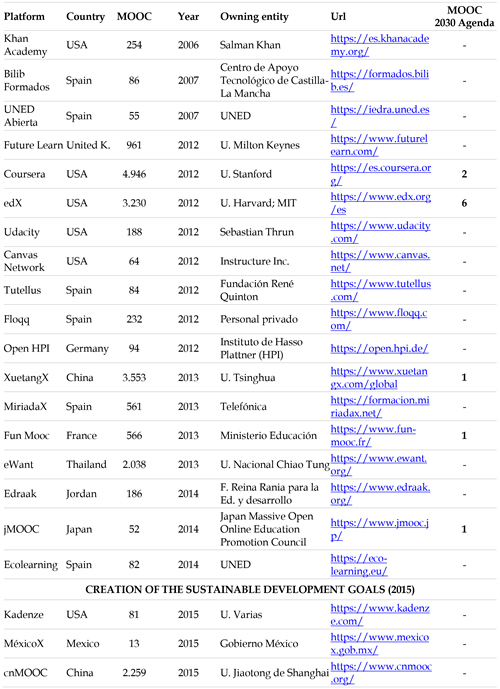
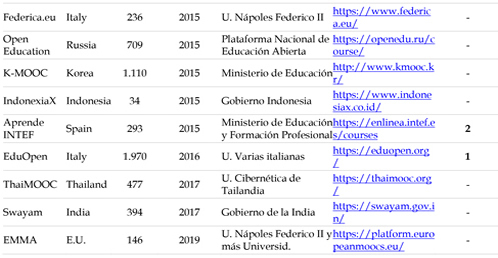
Source: own elaboration. Extracted from virtual ethnography
3.2. Bibliometric study
Through this research technique, it has been tried to extract the scientific production indexed in the online services on scientific databases Web of Science and Scopus since 2015, the year in which the 2030 Agenda was created, with the search options in the title of the following documents: “2030 agenda”, “SDG”, and “sustainable development goals”. The study offers the results with at least 3 scientific productions in one of the two resources mentioned. The purpose of this study is to find out which countries produce the most scientific literature about the 2030 Agenda and their relationship, with the data obtained in virtual ethnography and analysis of the platforms, to create the artificial neural network that can predict the percentages regarding the creation of new significant platforms and the creation of MOOCs on the theme of the 2030 Agenda and the SDGs. The bibliometric maps are presented below (Guzmán Sánchez and Trujillo Cancino, 2014), to have a graphic view of the volume of scientific production by countries.
As can be seen in the bibliometric maps, represented in Figures 2 and 3, the largest producer of scientific literature regarding the 2030 Agenda and the SDGs is Croatia, with publications only in Scopus (n = 166). The existence of significant virtual platforms of Croatian origin is unknown. China is the second country with the most scientific documents (n = 158) and the first in Scopus. It is currently the second country in the world that offers the most MOOCs through its main platforms (XuetangX, n = 3,553, and enMOOC, n = 2,259). In third place, Japan (n = 104) being jMOOC its most important platform. It is from the seventh place when the USA and many other countries with current MOOC production, and their own virtual
platforms such as Spain, France, Germany, United Kingdom, Italy, and Russia, appear. The results corroborate hypothesis 3 of the research, confirming that those countries that offer MOOCs are also producers of scientific documentation related to the 2030 Agenda and the SDGs. The results confirm that first-world and/or more developed countries are the ones with the most scientific production about the 2030 Agenda. It also stands out the relevant production from Eastern and Central European countries such as Poland, Slovenia, Czech Republic, Slovakia, and Serbia; and the little relevance of South American countries. Table 6 shows in detail the list of countries with scientific production classified from Web of Science and Scopus, and the total of both.
Source: elaboration with vosviewer v.1.6
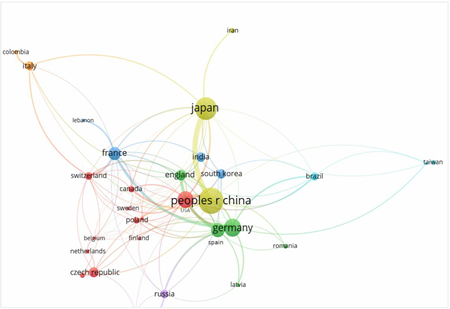
Figure 2. Bibliometric map, scientific production by countries in Web of Science
Source: elaboration with vosviewer v.1.6
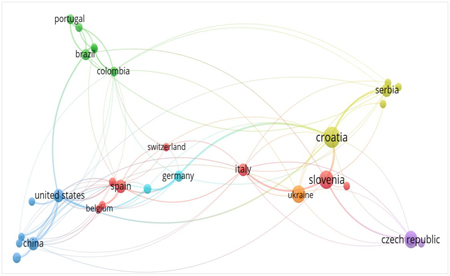
Figure 3. Bibliometric map, scientific production by countries in Scopus
Table 6. Scientific production in WOS and Scopus by countries regarding the 2030 Agenda and the SDGs
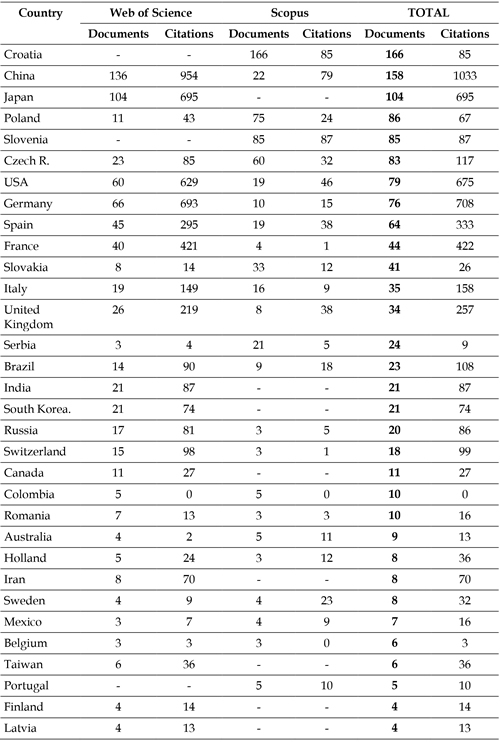
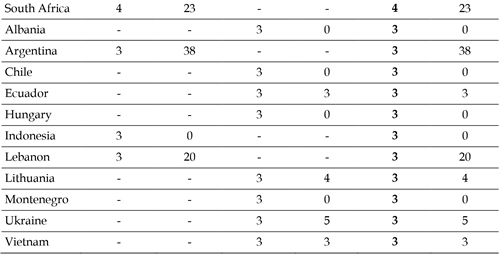
Source: Own elaboration
3.3. Creation of the Artificial Neural Network
With the results obtained in virtual ethnography, analysis of MOOC platforms, and bibliometric study, an artificial neural network is created to predict to what extent new significant MOOC platforms will be created and, on the other hand, in what percentage the new MOOCs will be about the subject and content of the 2030 Agenda and the SDGs. For the input layer of the neural network, 6 independent variables, both qualitative and quantitative, are included. These are the following: year of the foundation of the platform, years of antiquity, number of MOOCs currently offered, scientific documents that the country that owns the platform has produced, citations that the country that owns the platform has had, and the number of MOOCs offered by the platform regarding the theme of the 2030 Agenda and the SDGs. The output and/or response layer that we want to obtain is made up of the following qualitative and dichotomous dependent variables:
The model that is created is called multilayer perceptron since it will contain intermediate or hidden layers that determine the weights based on the relationship of the variables for the elaboration of the responses. The detail of these connections that make up the artificial neural network can be seen in detail in Figure 4, with the
thickest lines being the strongest connections between variables (neurons), until the answers are reached.
Fuente: Elaboration with software SPSS v.22
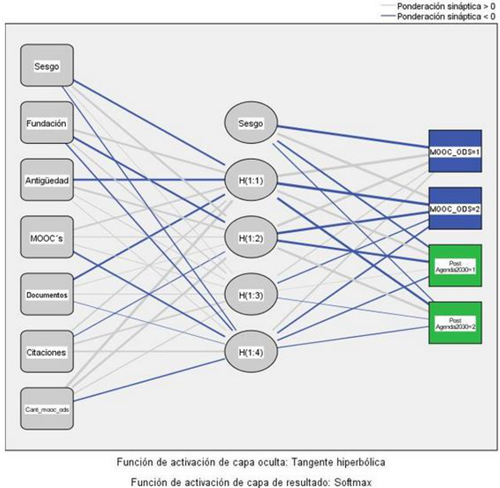
Figure 4. Artificial neural network. Connections between variables
Of the 30 cases available regarding MOOC platforms, 29 have been selected, leaving aside the EMMA project of the U.E. since different countries participate in it and the number of MOOCs corresponding to each of them cannot be determined, and for this reason, the results to be predicted by the artificial neural network can be altered. For the training of the neural network, 23 virtual platforms have been selected randomly and concerning those collected in virtual ethnography, so that through the specialized software SPSS v.22 the precise algorithms are determined for the program to search for the weights automatically and can deliver the best results. The remaining 6 cases and/or virtual platforms are tested so that the software performs overfitting in the results and the model can be used in the learning of new cases. Tables 7 and 8 present the results offered by the artificial neural network, based on the two dependent variables chosen to predict the behavior of virtual platforms and the MOOCs they offer regarding a theme and content focused on the 2030 Agenda and the SDGs.
Table 7. Results of Artificial Neural Network. Creation of new MOOCs about the 2030 Agenda and the SDGs
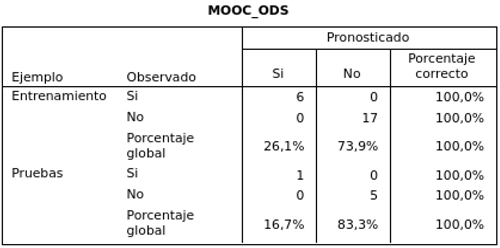
Source: elaboration with software SPSS v.22
When analyzing the results obtained in Table 7, it is confirmed that the Neural Network predicts in terms of training that 73.9% will not create MOOCs with a theme centered on the 2030 Agenda and the SDGs. In the testing section, if we use the neural network with new cases to continue learning it, 83.3% predict that MOOCs will not be created with the aforementioned topic. With these data, it is confirmed that hypothesis No. 4 of this research is not fulfilled. The results present very high levels in terms of no, so we can guess that new MOOCs may not be created with content focused on the 2030 Agenda and the SDGs. Concerning Table 8, the results offered by the Neural Network are as follows: in the training phase, 34.8% will create new significant MOOC platforms, but 65.2% will not. This means that new MOOC platforms will be created and will emerge but at a low rate and very slowly they will be implemented and consolidated. Regarding the testing phase and the possible use of new cases, the data are very similar; 33.3% yes, and 66.7% no.
Table 8. Results of Artificial Neural Network. Creation of meaningful new MOOC platforms
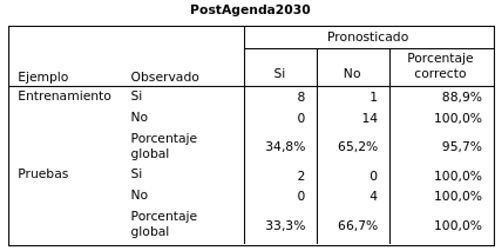
Source: elaboration with SPSS v.22
Therefore, with all the results obtained, and based on the hypotheses proposed for this research, it is confirmed that hypothesis No. 1 is not fulfilled since, since the 2030 Agenda was carried out in 2015, the same virtual platforms in the West as in the rest of the world, specifically Asia and the East, have been created and no more as was estimated. Concerning hypothesis No. 2, it is confirmed as true since the offer of MOOC courses focused on the main theme of the 2030 Agenda and the SDGs is barely relevant. Regarding hypothesis No. 3, the results corroborate that indeed, those countries that offer MOOCs are also producers of scientific documentation related to the 2030 Agenda and the SDGs. The results confirm that first-world and/or more developed countries are the ones that have the most scientific production on the 2030 Agenda. To end with hypothesis No. 4, it is confirmed with the created artificial neural network, that it is not fulfilled since the results present very high levels that predict that new MOOCs with content focused on the 2030 Agenda and the SDGs will not be created.
4. DISCUSSION AND CONCLUSIONS
This research has tried to verify and analyze the behavior of the virtual platforms that offer MOOCs and their producing countries, against the 2030 Agenda and the SDGs. Today, MOOCs have a very considerable social and institutional recognition and can be used as a model of educational communication to train those people who live in the most disadvantaged countries. After searching and analyzing the web, 30 platforms that offer this type of course have been selected based on their importance, consolidation and/or merging in the sector, owner entity, and social recognition since the beginning of this phenomenon in 2008. To date, the two major MOOC producing powers are the USA and China, followed by European countries such as Italy, the U. Kingdom, Spain, and France; and with very little relevant data in South America. One aspect to highlight in this regard is that countries and universities, generally South American, produce MOOCs and are hosted on platforms with more projection and social reach, such as Edx, Coursera, Canvas, etc. This may be data that explains that certain countries do not have their own significant MOOC platforms because their development and implementation policy has been that. Since 2015, the year in which the 2030 Agenda is first implemented, several important MOOC platforms have been created, whose owners are mainly Asian countries such as China, Korea, Thailand, India, Russia, and, to a lesser extent, Indonesia. New MOOC platforms have also been created in the West but with a lower volume of course offerings. It can be said that 2015 is the time of the explosion and production of MOOC platforms in the Asian and Eastern parts of the world, around 3 or 4 years later than in the Western world, which continue to monopolize the world market with the platforms created in 2011-2012 and whose owners are mainly Universities and private entities from the USA. In the Asian part, MOOC platforms are generally founded and supported by public entities such as Ministries of Education and also public Universities, allowing more open access and generic free certification. The last major platform to be created was EMMA in 2019, a European Union project with about 150 MOOCs. Since then, no more platforms have been created despite the global pandemic of COVID-19, since 2020. This incident should have caused a strong explosion in the creation of new and powerful MOOC platforms, due to the confinement and closure that was suffered in all countries and educational systems of the world. Today, only 1% of the world's population knows exactly what the 2030 Agenda and the SDGs are, and 25% only know the name. Given the importance and the problems that this entails, MOOC platforms offer, although, at much lower levels than today, courses focused on the 2030 Agenda and the SDGs. In short, these are courses that owner-platforms and institutions are not suggested to create, due to their difficulty in certification, the breadth of the subject, low enrollment levels, and the inconvenience of putting them into practice on a personal and also professional level. Nor do the new platforms created as a result of the 2030 Agenda present this issue in a significant way. The bibliometric study confirms that the most developed or first-world countries are the greatest producers of research on the 2030 Agenda and generally the owners of the platforms that offer MOOCs. It can be concluded, in this sense, that the MOOC phenomenon has already been established in the most advanced societies, permanently and as an educational and training resource. With all the data obtained, an innovative and creative proposal has been made, the creation of an artificial neural network to forecast the evolution of MOOC platforms and the subject matter in content focused on the 2030 Agenda and the SDGs. The results are not very encouraging because it is not estimated that more MOOCs will be created focused on the 2030 Agenda and the SDGs, although new virtual platforms that offer MOOC courses will be created but at a very slight pace and with very slow implantation and consolidation. A new wave and the creation of MOOC platforms are needed and necessary for the poorest and developing countries, mainly in Africa and South America, although it must be with the help of the most developed and based on the goals and objectives proposed in the 2030 Agenda. Concerning other research, studies have been carried out on the contribution of MOOCs to the 2030 agenda for sustainable development, concluding that MOOCs can guarantee inclusion, as they are massive, open, free, accessible, and always available, as long asaccess to technology and unlimited internet is ensured for the entire population (Roura Redondo, 2019). Other studies regarding the present are related to teaching strategies to innovate in higher education, proposing an analysis of the elements of linking universities with the global requirements of the sustainable development goals, to locate possibilities for innovation with teaching strategies (Ramírez Montoya, 2019). Along the same lines, we highlight studies related to multidisciplinary collaboration, MOOC, and educational research, addressing cross-cutting themes, such as networking, educational innovations, self-perceived skills, and innovative strategies such as challenges, gamification, and inverted learning, etc. (Ramírez Montoya and Mendoza Domínguez, 2019). Therefore, based on this research and other studies carried out, it can be concluded that MOOCs are a very valid resource to publicize and raise awareness in societies of what the 2030 Agenda and the Sustainable Development Goals are and mean. Studies also confirm that these projects can be developed and implemented mainly through the action of university institutions. MOOCs are a phenomenon in constant evolution and development but they must be up to date and in line with the needs and improvements that are proposed at the global and institutional level for a more equitable and sustainable planet. Regardless of those courses and/or topics most in-demand, MOOCs should be implemented and offered in this line and in others that promote a more human sense, so that all people are aware of social problems and can develop critical thinking. It is suggested for future research to continue researching MOOC platforms, learn about their themes, and their projection and implementation in more disadvantaged countries. We are already in an increasingly interconnected world in which it is unthinkable to be able to decide and take actions for global improvement without counting on all countries and multilateral organizations. The 2030 Agenda emerges as a social and global action but also as an opportunity to establish new governance models that take into account the equality of people in all senses and the sustainability of the planet. Currently, effective communication between governments, international organizations, and citizens is going to play a very important role in the development and achievement of the goals of the 2030 Agenda. MOOCs can be an impetus to make everyone aware of what the 2030 Agenda and the SDGs are and to raise awareness about them among the entire world population because the future of our planet depends solely and exclusively on ourselves.
REFERENCES
AUTHOR
José Javier Hueso Romero
Doctoral student in Education from UNED (Universidad Nacional de Educación a Distancia), study and research in the area of e-learning and MOOCs. Master’s Degree in Communication and Education on the Internet, with a specialty in the e-learning program, and research focused on the compared case study between the MOOCs of the MIT (Massachusetts Institute of Technology), UNED, and the ECO Project, and their relationship with higher education. Graduated in Social Education from the UNED and specialized in the analysis of socio-labor contexts and socio-educational intervention for the personal and social development of users and their responsible participation in different social and community settings. Experience in the prevention of minors at risk of social exclusion and in the design of programs for the integration of minors and families in situations of social exclusion.
ORCID ID: https://www.orcid.org/0000-0003-1375-2028
ResearchGate: https://www.researchgate.net/profile/J-Javier-Hueso-Romero